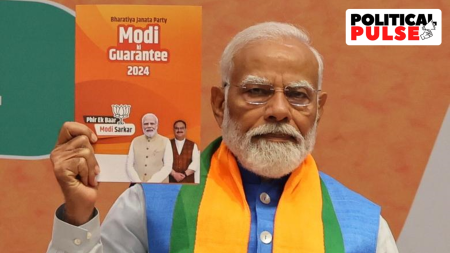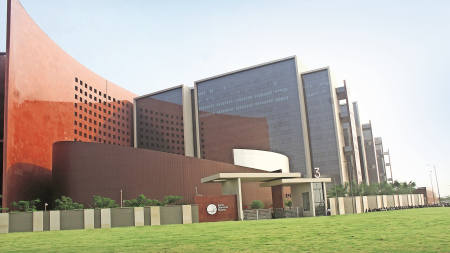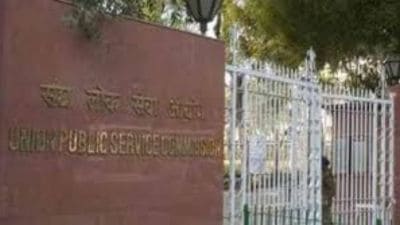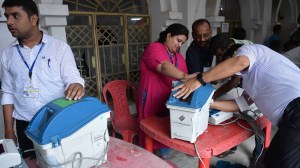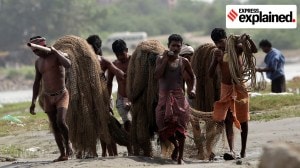- India
- International
When white turns gold
A simple low-cost intervention — moisture testing machine — has enabled cotton growers of this Telangana district to realise better prices.
 A farmer’s kapas crop being tested for moisture content at a Rythu Mitra Kendra in Khammam district of Telangana. Express
A farmer’s kapas crop being tested for moisture content at a Rythu Mitra Kendra in Khammam district of Telangana. Express
The Cotton Corporation of India (CCI) has procured 4,53,256.47 quintals of kapas (raw un-ginned cotton) from farmers of Khammam in the current 2019-20 marketing season since early November. This purchased quantity is over 56% more than the 2,89,851.96 quintals bought by the government-owned agency at the Centre’s declared minimum support price (MSP) of Rs 5,550 per quintal. In terms of lint — the pressed white fibre from kapas after separation of its seeds through mechanical ginning — the increase is from 55,083 bales to 85,276 bales of 170 kg each.
But it is not just the higher procurement from this southeastern district of Telangana that’s impressive. More significant is the reason, which has less to do with production; cotton acreage in Khammam this time has gone up only marginally to 98,599 hectares, from the normal of 96,116 hectares. According to
R Jeyakumar, deputy general manager of CCI, the main factor behind the 1.6 times jump in procurement is the Rythu Mitra Kendras across the district equipped with cotton moisture testing machines. The district administration activated 106 such temporary Kendras or kiosks, each manned by an agriculture extension officer (AEO) and a village revenue officer (VRO), during this marketing season.
CCI procures kapas from farmers only if the moisture content in the crop is between 8% and 12%. The Rs 5,550/quintal MSP is payable solely for the kapas having 8% moisture content. It reduces progressively with this content going up — to Rs 5,494/quintal for 9%, Rs 5,439/quintal for 10%, Rs 5,383/quintal for 11%, and
Rs 5,328/quintal for 12%. Beyond 12%, which compromises the fibre quality, no produce is accepted.

“We ended up buying more simply due to these decentralised village-level moisture measurement camps. They resulted in an increase in the number of cotton farmers from Khammam, whose crop adhered to the maximum 12% moisture limit fixed by us. They waited till their kapas had dried enough, before bringing it to our procurement centres,” Jeyakumar points out.
It is very often the case that farmers get to know about their crop’s moisture levels only after bringing it to CCI’s purchase centres at or adjoining the wholesale mandis. When the kapas gets rejected because of having more than the prescribed moisture limit — which is normal for the crop that is harvested and brought for sale early — the grower is, then, compelled to go to the private traders’ outlets, where it fetches a rate well below the MSP.
“This is the first season, when we opened these Kendras where farmers can sample their produce and check the moisture content before loading it for taking to the market. The AEO and VRO provide them assistance and advise on whether this is the right time to sell or should they allow the crop to dry more. Even if the farmer doesn’t want to sell to CCI, he becomes more aware about the quality of his produce and is, hence, empowered to bargain better with the private trader or ginner. In the absence of such a facility that gives prior information on its moisture content, the farmer is reduced to being a passive price taker” notes R V Karnan, district collector of Khammam.
Khammam has eight wholesale markets and five CCI procurement centres. The 106 temporary Kendras, having moisture testing machines for cotton as well as paddy, are closer to the fields of farmers, who neither need to travel much nor carry more than a small sample of their crop now. Karnan claims that 11,276 farmers — out of the district’s total 15,249 who sold to CCI — visited the kiosks and 7,461 kapas samples got tested during this season. The 4.53 lakh quintals procured by CCI — worth Rs 245 crore taking an average MSP of
Rs 5,400/quintal at just above 10% moisture content — accounted for over a fifth of Khammam’s estimated kapas production of 22.18 lakh quintals for 2019-20.
On paper, the Rythu Mitra Kendras are a simple and low-cost intervention. The 120 moisture measurement machines bought by the district administration cost only around Rs 14,200 a piece. But for the ordinary farmer who is regularly short-changed at the mandis, it has made a significant difference to the realisation on his produce. And that comes merely from access to better information. It’s an idea worth taking to farmers in other parts of the country as well.
Apr 16: Latest News
- 01
- 02
- 03
- 04
- 05




